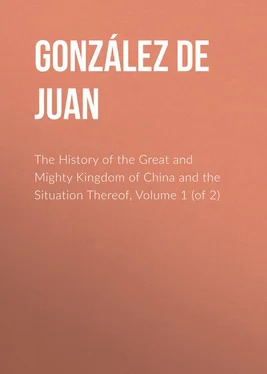Juan González de Mendoza - The History of the Great and Mighty Kingdom of China and the Situation Thereof, Volume 1 (of 2)
Здесь есть возможность читать онлайн «Juan González de Mendoza - The History of the Great and Mighty Kingdom of China and the Situation Thereof, Volume 1 (of 2)» — ознакомительный отрывок электронной книги совершенно бесплатно, а после прочтения отрывка купить полную версию. В некоторых случаях можно слушать аудио, скачать через торрент в формате fb2 и присутствует краткое содержание. Жанр: foreign_antique, foreign_prose, Путешествия и география, на английском языке. Описание произведения, (предисловие) а так же отзывы посетителей доступны на портале библиотеки ЛибКат.
- Название:The History of the Great and Mighty Kingdom of China and the Situation Thereof, Volume 1 (of 2)
- Автор:
- Жанр:
- Год:неизвестен
- ISBN:нет данных
- Рейтинг книги:4 / 5. Голосов: 1
-
Избранное:Добавить в избранное
- Отзывы:
-
Ваша оценка:
- 80
- 1
- 2
- 3
- 4
- 5
The History of the Great and Mighty Kingdom of China and the Situation Thereof, Volume 1 (of 2): краткое содержание, описание и аннотация
Предлагаем к чтению аннотацию, описание, краткое содержание или предисловие (зависит от того, что написал сам автор книги «The History of the Great and Mighty Kingdom of China and the Situation Thereof, Volume 1 (of 2)»). Если вы не нашли необходимую информацию о книге — напишите в комментариях, мы постараемся отыскать её.
The History of the Great and Mighty Kingdom of China and the Situation Thereof, Volume 1 (of 2) — читать онлайн ознакомительный отрывок
Ниже представлен текст книги, разбитый по страницам. Система сохранения места последней прочитанной страницы, позволяет с удобством читать онлайн бесплатно книгу «The History of the Great and Mighty Kingdom of China and the Situation Thereof, Volume 1 (of 2)», без необходимости каждый раз заново искать на чём Вы остановились. Поставьте закладку, и сможете в любой момент перейти на страницу, на которой закончили чтение.
Интервал:
Закладка:
"Travelling more eastward, I came vnto a city named Fuco, which conteineth 20 miles in circuit, wherein be exceeding great and faire cocks, and al their hens are as white as the very snow, having wol in stead of feathers, like vnto sheep. It is a most stately and beautiful city, and standeth vpon the sea. Then I went 18 daies iourney on further, and passed by many prouinces and cities, and in the way I went ouer a certain great mountaine, vpon y eone side whereof I beheld al liuing creatures to be as black as a cole, and the men and women on that side differed somewhat in maner of liuing fro' others: howbeit, on the other side of the said hil euery liuing thing was snow-white, and the inhabitants in their maner of liuing were altogether vnlike vnto others. There, all maried women cary, in token that they haue husbands, a great trunke of horne vpon their heads. From thence I traueiled 18 dayes journey further, and came vnto a certaine great riuer, and entered also into a city, whereunto belongeth a mighty bridge to passe the said river. And mine hoste with whom I soiourned, being desirous to shew me some sport, said vnto me: 'Sir, if you will see any fish taken, goe with me.' Then he led me vnto the foresaid bridge, carying in his armes with him certaine diue-doppers or water-foules, bound vnto a company of poles, and about every one of their necks he tied a thread, least they should eat the fish as fast as they tooke them: and he caried 3 great baskets with him also: then loosed he the diue-doppers from the poles, which presently went into the water, and within lesse then the space of one houre, caught as many fishes as filled 3 baskets: which being full, mine hoste vntyed the threads from about their neckes, and entering a second time into the river they fed themselues with fish, and being satisfied they returned and suffered themselues to be bound vnto the saide poles as they were before. And when I did eate of those fishes, methought they were exceeding good.
"Trauailing thence many dayes iourneys, at length I arriued at another city called Canasia [Quinsay, or Hang-cheou], which signifieth in our language the city of heaven. Neuer in all my life did I see so great a citie; for it continueth in circuit an hundreth miles: neither saw I any plot thereof, which was not thoroughly inhabited: yea, I sawe many houses of tenne or twelue stories high, one above another. It hath mightie large suburbs, containing more people then the citie it selfe. Also it hath twelue principall gates: and about the distance of eight miles, in the high way vnto every one of the saide gates, standeth a city as big by estimation as Venice and Padua. The foresaid city of Canasia is situated in waters and marshes, which alwayes stand still, neither ebbing nor flowing: howbeit it hath a defence for the winde like vnto Venice. In this citie there are mo then 10,002 bridges, many whereof I remembered and passed over them: and vpon euery of those bridges stand certaine watchmen of the citie, keeping continuall watch and ward about the said city, for the great Can the emperour of Catay.
"The number of his owne followers, of his wives attendants, and of the traine of his first begotten sonne and heire apparent, would seeme incredible vnto any man, vnlesse hee had seene it with his owne eyes. The foresayd great Can hath deuided his empire into twelue partes or prouinces, and one of the sayd prouinces hath two thousand great cities within the precincts thereof. Whereupon his empire is of that length and breadth, that vnto whatsoeuer part thereof he intendeth his iourney, he hath space enough for six moneths continual progresse, except his islands, which are at the least 5,000.
"The foresayd emperor (to the end that trauailers may haue all things necessary throughout his whole empire) hath caused certaine innes to be prouided in sundry places upon the high wayes, where all things pertaining vnto victuals are in a continuall readinesse. And when any alteration or newes happens in any part of his empire, if he chance to be farre absent from that part, his ambassadors vpon horses or dromedaries ride post vnto him; and when themselues and their beasts are weary, they blow their horne; at the noise whereof, the next inne likewise prouideth a horse and a man, who takes the letter of him that is weary, and runneth vnto another inne: and so by diuers innes, and diuers postes, the report, which ordinarily could skarce come in 30 dayes, is in one naturall day brought vnto the emperor: and therefore no matter of any moment can be done in his empire, but straightway he hath intelligence thereof."
The next traveller of whom we have to make a short mention, is the celebrated Arabian author Ibn Batuta, the date of whose journey is 1324. His point of arrival in China was Zaitun, the port already mentioned of Marco Polo's embarcation. Its identity is not easy of recognition. From this port he would seem to have travelled to Hang-cheou and back again, embarking again at Zaitun. Although his route is not distinctly traceable, the account he gives of the country appears very accurate. He particularizes the facility and safety of travelling, and the convenient, but at the same time rigid surveillance of the hostelries, in which a register was kept of all strangers who lodged in them. Silkworms and silk are mentioned, but the latter as being inferior in value to cotton. The paper money and the manufacture of porcelain are also referred to.
In pursuance of our chronological arrangement of travels in China, we shall here introduce the account of an embassy, though not European, sent by Mirza Shah Rokh, one of the sons of Tamerlane, to Cathay, in the year 1419. The ambassadors set out from Herat in Persia, about the month of November in that year, and reached a spot in the desert within twelve stages of Sekju (Sucheu), near the great wall in Shensi, on the 14th of June 1420. At this place they were met, by order of the khan, by some Cathayans, who erected tents or huts for their accommodation in the desert, and plentifully supplied them with roasted geese, fowls, and various kinds of meat, fruits, etc., which were served to them on china dishes; they likewise regaled them with a variety of strong liquors, together with a pot of Chinese tea. The chief person in the embassy was the Emir Sadi Khoja; and, according to the list of the names of the ambassadors and the number of their retinue, taken down by some Cathayan secretaries, the entire embassy, including merchants, amounted to eight hundred and sixty persons. In taking this list, the Cathayan officers earnestly desired that the exact number should be stated, as a want of truthfulness would involve them in discredit. Two days after their arrival, they were invited to the encampment of the dankji or governor of the borders of Cathay, by whom they were entertained with a magnificent feast. On reaching the spot, they found a square space of ground enclosed with tents, in the centre of which was a lofty awning of cloth supported on wooden pillars, with an imperial canopy of state at one end, where the throne was placed, as if for the emperor, with other seats on each side: on the left of this throne were placed the ambassadors, and on the right the Cathayan officers. Each ambassador had placed before him two tables, the one covered with a variety of meats and fruits, the other with cakes and bread, gracefully ornamented with silk and paper. The other persons present had but one table apiece. At the lower end of the tent stood a sideboard covered with silver and china. After the banquet they were entertained with music and a comedy, in which the actors wore masks representing the faces of animals: among these a child, enclosed in the body of an artificial stork, amused them by performing a variety of curious antics. On the next day they reached a karawl, a strongly fortified outpost, built in a defile in the mountains, through which all travellers that way must unavoidably go. Here their retinue was again carefully numbered. They next arrived at Sucheu, a large and strong square city, where they had lodgings appointed to them in a public building over the city gates, and were amply provided with every convenience and comfort for themselves and their horses, even the servants having mattresses and counterpanes allowed them for their beds.
Читать дальшеИнтервал:
Закладка:
Похожие книги на «The History of the Great and Mighty Kingdom of China and the Situation Thereof, Volume 1 (of 2)»
Представляем Вашему вниманию похожие книги на «The History of the Great and Mighty Kingdom of China and the Situation Thereof, Volume 1 (of 2)» списком для выбора. Мы отобрали схожую по названию и смыслу литературу в надежде предоставить читателям больше вариантов отыскать новые, интересные, ещё непрочитанные произведения.
Обсуждение, отзывы о книге «The History of the Great and Mighty Kingdom of China and the Situation Thereof, Volume 1 (of 2)» и просто собственные мнения читателей. Оставьте ваши комментарии, напишите, что Вы думаете о произведении, его смысле или главных героях. Укажите что конкретно понравилось, а что нет, и почему Вы так считаете.












